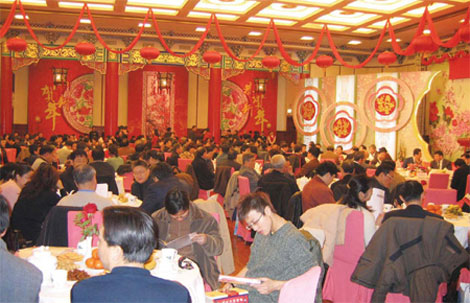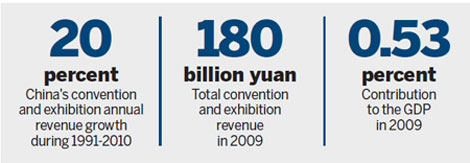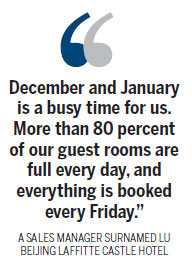Top News
Conference calls
Updated: 2011-01-07 11:32
By Wang Zhuoqiong and Cai Xiao (China Daily European Weekly)
 |
|
With the boost of the domestic economy, government entities and related institutions, organizations and enterprises have expanded the scale of their conferences, fueling the red-hot business. Bao Xinguo / for China Daily |
From October to the Spring Festival, Beijing's resorts and hotels gear up for lucrative annual company conventions
Despite freezing outdoor temperatures, throngs of visitors to a northern Beijing conference building make for a heated atmosphere as they crowd check-in counters and meeting and dining rooms for year-end gatherings and galas.
"December and January are busy times for us," says a sales manager surnamed Lu with Beijing Laffitte Castle Hotel, a European-style resort. "More than 80 percent of our guest rooms are full every day, and everything is booked every Friday."
The hotel, which aspires to be the designated conference venue for government or government-related institutions, recently gained fame as the place when Microsoft founder Bill Gates and investment guru Warren Buffett hosted China's wealthiest billionaires at a dinner to share thoughts on philanthropy.
"Yes, that helps," Lu says. "But our business has always been great."
"Almost all employers have an annual gala. You need a large space to accommodate all these people. That is what we are here for," Lu says.
Clients often come with 60 to 70 people, mainly government or government-related institutions and enterprises, for conferences on Thursdays and Fridays, he says.
The Laffitte has 14 conference rooms for 60 to 80 people that cost 3,000 yuan (340 euros) or 5,000 yuan for a half day. To overnight in one of the 505 guest rooms, including breakfast for two, costs on average 500 yuan.
Lu has a sales target of more than 10 million yuan a month during peak season and about 7 million yuan a month the rest of the year.
The Laffitte is one of several resorts and hotels in Beijing that mainly serve conferences. Others are also equipped for entertainment, with hot springs, swimming pools, skiing and other features.
At least 60 to 70 percent of the business at suburban resorts - and in some cases up to 90 percent - comes from meetings, with the peak season running from October to just after the Spring Festival, says Wang Qingdao, editor-in-chief of Conference Magazine.

In downtown Beijing, hotel sales offices are hectic with calls for conference room bookings. "Our conference rooms have been reserved long in advance," says Rebecca Gong, public relations manager at Beijing Landmark Towers Co Ltd, a complex with offices and a hotel in eastern Beijing.
With a dining hall that can seat 600 and located at the East Third Ring CBD area, Landmark Towers considers itself ideal for conferences. And conferences have the added benefit for Landmark Towers of bringing diners to its restaurants and room occupancy, Gong says.
Organizations often schedule conferences and meetings at the end of each year to solve problems, and to improve communication and offer incentives, says Wang.
With the boost of the domestic economy, government entities and related institutions, organizations and enterprises have expanded the scale of their conferences, fueling the red-hot business.
Conference Magazine's research shows that the average spending for each person is 500 yuan a day. But consumption varies dramatically, and at one conference in Beijing, spending reached last year's record of 10,000 yuan a day for each person.
Conferences are a barometer of the economy. "Conventions follow the trend of the national economic development closely," says Xu Feng, marketing director of the China National Convention Center (CNCC), which is in the heart of the Olympic Green.
Xu says the center prospered in 2010, with China's economic growth boosting conventions. And it has meetings booked up to 2018.
 |
Xu says the real estate sector accounted for a limited number of meetings, while those involving environmental protection and culture, including the Confucius Institution Conference, made up the lion's share last year.
Because of strong government support for the development of regional infrastructures, the World Congress of Cardiology and the World Congress on High Speed Rail were held in June and December.
Wu Shaoyuan, director of conventions at the Chinese International Scientific Convention Center, says meetings would always be popular because face-to-face communication is important.
"Unlike the videophone or e-mail, conventions bring people together to communicate in person and brainstorm for good ideas," he says.
Wu says conventions are highly profitable businesses. For instance, he said, if the registration fee for a meeting is 5,000 yuan and 1,000 people attend, that yields the organizer 5 million yuan.
And if a hotel room retails for 700 yuan a night and the organizers pay the wholesale price of 600 yuan, a five-day meeting with 1,000 participants brings a 50,000-yuan commission.
Wu says Beijing's direct income in conventions and exhibitions totaled more than 13 billion yuan in the first 11 months of 2010, and Shanghai had received about 17 billion yuan in that period.
Total revenue in China was estimated at 100 billion yuan.
"But high profits come along with high risks, and the shortage of investment funding is the main challenge," Wu says.
Wu says bidding for an international convention can cost several hundred thousand yuan, and many centers do not have that financial power. But he speaks highly of Chengdu, the provincial capital of Southwest China's Sichuan province, which has developed a successful process for bidding on conventions and has gained an annual revenue of 3 billion yuan.
"They ask a certain hotel to pay the bid fund first. If it is successful, they arrange for participants to stay in the hotel and repay them," Wu says.
Though venues are increasing, thanks to the thirst for conference venues, companies and institutions are having increasing difficulty in finding an ideal location for large gatherings.
"It is very hard for us to find a hotel with a conference hall and guest rooms that can accommodate 500 people at a time," says Christina Wang, a purchasing manager with a leading international pharmaceutical company's office in Beijing.
The company spent more than 5 million yuan on its annual gala at a suburban hot spring resort for four days because it was the only place they could book for such a large audience, with all of their sales representatives.
"It is absolutely crucial for a company that depends on sales to have a team-building, experience, a sharing and rewarding moment," Wang says. "But arranging it can be a headache."
Conference experts say public relations companies and tourism agencies in China have earned big money in planning, organizing and running conferences for companies and institutions.
The top 10 conference facilitators in China earned 3.5 to 4 billion yuan in 2010, says Wang, from the Conference Magazine.
E-paper

Ear We Go
China and the world set to embrace the merciful, peaceful year of rabbit
Preview of the coming issue
Carrefour finds the going tough in China
Maid to Order
Specials

Mysteries written in blood
Historical records and Caucasian features of locals suggest link with Roman Empire.

Winning Charm
Coastal Yantai banks on little things that matter to grow

New rules to hit property market
The State Council launched a new round of measures to rein in property prices.
